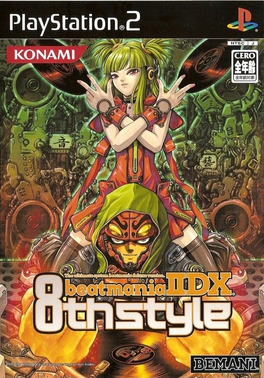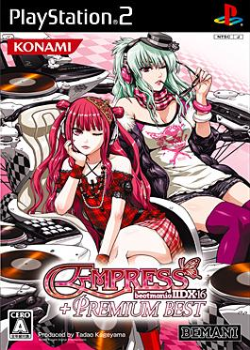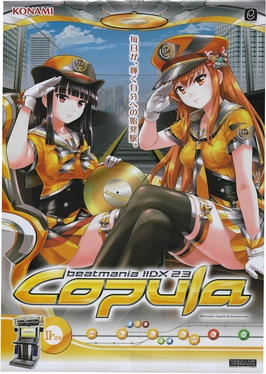Dance Dance Revolution (DDR) is a music video game series produced by Konami. Introduced in Japan in 1998 as part of the Bemani series, and released in North America and Europe in 1999, Dance Dance Revolution is the pioneering series of the rhythm and dance genre in video games. Players stand on a "dance platform" or stage and hit colored arrows laid out in a cross with their feet to musical and visual cues. Players are judged by how well they time their dance to the patterns presented to them and are allowed to choose more music to play to if they receive a passing score.
Beatmania (ビートマニア) is a rhythm video game developed and distributed by Japanese game developer Konami and first released in December 1997. It contributed largely to the boom of music games in 1998, and the series expanded not only with arcade sequels, but also moved to home consoles and other portable devices, achieving a million unit sales. The Bemani line of music games from Konami is named after the series, was first adopted in the arcade release of Beatmania 3rdMix and kept ever since. The series came to an end with the last game being Beatmania The Final, released in 2002.

Beatmania IIDX (IIDX) is a series of rhythm video games, that was first released by Konami in Japan on 26 February 1999. Beatmania IIDX has since spawned 31 arcade releases and 14 console releases on the Sony PlayStation 2. It is the sequel to the beatmania game series, and is part of the Bemani line of music games.
Bemani, stylized as BEMANI, is Konami's music video game division. Originally named the Games & Music Division (G.M.D.), it changed its name in honor of its first and most successful game, Beatmania, and expanded into other music-based games, most notably rhythm games such as Dance Dance Revolution, GuitarFreaks, and DrumMania.

Yoshitaka Nishimura (西村宜隆), better known as DJ Yoshitaka, is a composer for Konami's line of Bemani games. He has been making solo songs since the release of Beatmania IIDX 11: IIDX Red, though he has had previous Bemani involvement as a member of Osamu Migitera's Des-ROW group. He often composes for the Beatmania IIDX and the Pop'n music series, and then began composing for the Guitar Freaks & DrumMania and the Dance Dance Revolution series in 2005 and 2007, respectively. DJ Yoshitaka still often works with Des-ROW for some Pop'n music songs. In the Reflec Beat series, DJ Yoshitaka regularly appears alongside fellow composer Sota Fujimori as a double act, Venus.

Dance Dance Revolution Extreme is a music video game by Konami and is the eighth release in the main Dance Dance Revolution (DDR) series. It was released on December 25, 2002, for Japanese arcades, on October 9, 2003, for the Japanese PlayStation 2, and on September 21, 2004, for the North American PlayStation 2. This game is the ninth release in North America, but despite having the same name as its Japanese counterpart, its gameplay and soundtrack is significantly different and won the Video Music Awards in 2005 on MTV for Best Video Game Soundtrack.

beatmania IIDX 10th Style is the tenth game in the beatmania IIDX series of music video games. It was released in arcades by Konami in early 2004.

Beatmania IIDX 9th Style is the ninth game in the beatmania IIDX series of music video games. It was released in arcades by Konami in 2003. The game features over 50 new songs, some of which can be unlocked using Konami's e-Amusement platform – which made its official debut on 9th Style.

beatmania IIDX 8th Style is a 2002 arcade game released by Konami. A PlayStation 2 version was released in 2004.

beatmania IIDX 7th Style is the seventh game in the beatmania IIDX series of music video games. It was released in arcades by Konami in March 2002.

beatmania IIDX 5th Style is the fifth game in the beatmania IIDX series of music video games. It was released in arcades by Konami in 2001. The game features 35 new songs, five of which are hidden. New features introduced in this version are auto-scratch, as well as two more Hi-Speed settings 5th Style's songlist featured the first songs that would later become "flashing 7s", here differentiated from regular 7s with a kanji meaning "forbidden".

beatmania IIDX 3rd Style is a music video game developed by Bemani and published by Konami, initially released as an arcade game in Japan on February 25, 2000, and subsequently ported to the PlayStation 2 on November 2. 3rd Style removed the 4-keys mode from previous installments and replaced it with the Light7 difficulty, giving most songs a fully separate, easier notechart. The game also introduced Free Mode and Extra Stage, and featured a new aesthetic.
Beatmania IIDX Club Version was released on April 21, 1999 by Konami to the Japanese arcade audience. It could be linked with a Dance Dance Revolution machine for simultaneous play.

Beatmania IIDX is an arcade music video game developed by Bemani and published by Konami. It was released in Japan on February 26, 1999. The objective is to perform songs using a controller with seven keys and a turntable. After the surprise success of Beatmania, Benami conceived IIDX to simulate an actual disc jockey (DJ) live performance. Its arcade cabinet contains a widescreen monitor, speakers, and eight spotlights. Bemani later developed several updated versions of IIDX to increased success. The game retrospectively received a positive reception from video game publications for its gameplay and increased difficulty. A sequel, Beatmania III, was released in 2000.

Beatmania IIDX 16: Empress is the 16th game in the Beatmania IIDX series of music video games. It was released in arcades by Konami on November 19, 2008. The game features over 50 new songs, some of which are unlocked over Konami's e-Amusement platform. The design of Empress's interface is based on a pink color scheme, dominated by sparkles, butterfly wings, and motifs of royalty and jewellery. A PlayStation 2 port for the game was released on October 15, 2009, in Japan.

Beatmania IIDX 17: Sirius is the 17th installment in Konami's Beatmania IIDX series of music video games. The main motif of Sirius's UI is astronomy, as the game is named after Sirius, known to be the brightest star in the night sky. Public location tests began on May 27, 2009, and the game itself was released on October 21, 2009.

Reflec Beat is a series of music video games by Konami which debuted in 2010. Reflec Beat uses a touch screen as its main method of control - the first in the Bemani series to do so - and has gameplay based on 2-player competition, which has been compared to air hockey.

Beatmania IIDX 19: Lincle is the 19th game in the beatmania IIDX series of music video games. The location test itself was announced on April 18, 2011. The location test was held first on Akihabara on April 20, 2011. Umeda's location test started on April 22, 2011, and both ended on April 25, 2011. Fukuoka and Nagoya had their location test started from April 28, 2011 until May 1, 2011. Kyoto and Sapporo's location test started on May 6, 2011 until May 8, 2011. It was released on September 15, 2011.

Beatmania IIDX 23: Copula is the 23rd installment of the Beatmania IIDX series. The first location test was held at the Tokyo Lesiure Land #2 location in Akihabara, Japan from July 10 through July 12, 2015. It was released on November 11, 2015. It was the last entry in the Beatmania series made by Konami Digital Entertainment before the division was renamed Konami Amusement.

Beatmania IIDX 27: Heroic Verse is the 27th installment of the Beatmania IIDX series. It takes on the theme of superheroes within a rhythm game multiverse, and was the first arcade game in its series to have an official release in North America.
















